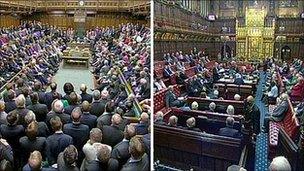MPs reverse Lords welfare defeats
- Published
- comments

Ministers say the proposals are backed by the public
MPs have overturned a series of defeats inflicted on the government's welfare reform bill in the House of Lords.
The coalition won seven key votes in the Commons, rejecting amendments made by peers and reinstating their original proposals into the legislation.
These include plans for a £26,000 annual limit on total household benefits, including child benefit.
Ministers say they will use a rule known as "financial privilege" to ensure Parliament approves the cap.
A special committee of MPs from all parties approved the move on Wednesday.
This will mean the Lords cannot send the same amendments back to the Commons when they re-consider the bill for a final time, preventing what is known as "ping pong" between the two chambers and effectively ending parliamentary opposition.
The measure, which the government says it will also apply to Lords amendments on employment and support allowance (ESA), relates to the principle that the Lords cannot oppose tax and spending decisions agreed by the Commons.
During nearly seven hours of debate in the Commons, the government won a series of votes on controversial aspects of the bill with large majorities.
They voted by 334 to 251 to overturn the Lords amendment - tabled by a group of bishops - which would exclude child benefit from counting towards the £26,000-a-year cap on benefits to working-age households.
The cap is set at the equivalent to the average post-tax salary of a working household.
Labour say they support the cap in principle but argue that rather than one national cap - there should be local caps, set by an independent commission.
'Transitional arrangements'
In the Commons, Work and Pensions Minister Chris Grayling said that idea was "ill-thought out" and "would be more credible if it was not being made at the very last minute".
He said there were already exemptions to the cap - such as families in receipt of Disability Living Allowance (DLA) and Working Tax Credit - and outlined "transitional arrangements" to minimise the impact.
David Cameron taunted the Labour front bench and called for a reaction on welfare reforms
People who had been in work for the previous 12 months would get a nine-month "grace period" before the cap kicked in and he said people in receipt of the "support component" of ESA - for people deemed unable to work due to illness - but who do not receive DLA, would not be penalised.
Additional payments would be made to families in certain circumstances, following a similar model used when the housing benefit cap was introduced - at a cost of up to £80m for 2013/2014 and £50m in 2014/2015.
And he said the policy would be reviewed "in a transparent way" - as they would with any major policy change of this kind.
For Labour, Liam Byrne told MPs there were "dangerous flaws" in the "one-cap-fits-all approach".
He dismissed government claims that Labour had never raised the issue of a local cap before and said they had made plenty of calls for safeguards in the cap.
He said the government had already "burnt a third of the savings they proposed for this measure" - because they had got the policy wrong - and the proposal had become a "dog's breakfast".
The government's decision to use financial privilege rules has been criticised by Labour peers.
And former Conservative chancellor Lord Mackay - who led a Tory rebellion in the Lords against charges for parents to access the Child Support Agency - suggested it was "a waste of taxpayers' money at a time of considerable austerity" for peers to pass amendments which were then rejected out of hand.
'Waste of money'
Earlier MPs voted down Lords changes to reduce entitlements to employment and support allowance (ESA).
They voted by 324 to 265 to back the government over plans to stop young disabled people who have never worked, due to illness or disability, from being able to claim "contributory" ESA - usually paid to those who have paid a certain amount of National Insurance.
They backed ministers by 332 to 266 over plans to means-test the same allowance after 12 months for those judged capable of working at some point in future.
Four Lib Dem MPs, including former leader Sir Menzies Campbell, defied their party leadership over the issue.
And MPs voted down a peers' amendment that would have exempted some cancer patients from means testing by 328 to 265.
They also reversed a Lords amendment limiting a reduction to the lower rate of the "disabled child element" of Child Tax Credits under the new Universal Credit system, by 324 votes to 255.
Critics say the move will hit working people facing severe financial difficulties - and could cost them over £1,300 a year.
The government says it wants to target support at the children with the highest care needs - and say there will be transitional protection so those already in receipt of the benefit will not lose money.
MPs also voted to overturn a Lords proposal calling for social tenants with one spare room to be exempt from new "under-occupancy penalties" linked to housing benefit. It won the vote by 310 to 268.
It also overturned the Lords amendment calling for single parents not to be charged for accessing the Child Support Agency by 318 to 257 votes - but only after ministers said they would reduce planned upfront fees to £20.
- Published2 February 2012
- Published1 February 2012
- Published23 January 2012